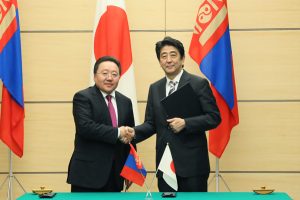This year marks the 50th anniversary of the establishment of Mongolia-Japan diplomatic relations. But in the middle of the landmark year, the political assassination of former Japanese Prime Minister Abe Shinzo was a significant shock to Mongolia, given the immense contribution of the Abe administration in bolstering Japan-Mongolia relations.
From its election win in late 2012 to Abe’s retirement in 2020, the Abe administration illustrated its commitment and continued efforts in bolstering Japan-Mongolia relations, which ultimately reached a peak in 2015 as the two countries became strategic partners.
From a Japanese foreign policy point of view, having Mongolia as a close partner helps Tokyo navigate regional issues such as dealing with North Korea. In addition, Mongolia’s democratic governance and society strengthened both government-to-government and people-to-people relations. During the Abe administration, the number of Mongolian students and workers in Japan increased immensely.
Moreover, Mongolia poses no direct threat to Japanese territorial integrity, making it somewhat of a rarity among Japan’s East Asian neighbors. Japan has ongoing territorial disputes with Russia (the Kuril Islands/Northern Territories), China (the Senkaku/Diaoyu Islands), and South Korea (the Dokdo/Takeshima Islands).
In Northeast Asia, the strong ties between Mongolia and Japan, both democratic nations, create a modus operandi for negotiations, dialogues, and conflict resolution. The Abe administration understood this strategic dynamic of Japan-Mongolia bilateral relations and enforced it in a mutually beneficial way.
Former Foreign Minister of Mongolia Purevsuren Lundeg stated in memory of Abe, “When Mongolia first initiated the Ulaanbaatar Dialogue on Northeast Asia, he was the first one to fully support the initiation. Also, among G-7 leaders, Abe was the single leader who came to Mongolia three times.”
Abe made his first state visit to Mongolia in 2013 on the occasion of the 40th anniversary of Japan-Mongolia diplomatic relations. Abe met with then-President Elbegdorj Tsakhia and Prime Minister Altankhuyag Norov. During an editorial written for Mongolian newspapers on the occasion of his visit, Abe stated that Japan-Mongolia relationship is supported by the “‘Three Spirits’ of freedom and democracy, peace, and mutual benefit.” On that basis, then-Foreign Minister Kishida Fumio – currently Japan’s prime minister – pledged in 2014 that “Mongolia and Japan will enhance mutual understanding and trust through multi-layered and strategic dialogue.”
Abe’s 2013 visit resulted in an economic agreement in which Japan supported Mongolia’s mining industry by establishing a credit line for purchasing mining machinery from Japanese companies such as Komatsu. In March 2013, Abe proposed the Erch Initiative to accelerate the Japan-Mongolia economic partnership. For Mongolia, Japan’s continued financial and technical support is fundamental in augmenting the country’s economic diversification.
During his second state visit to Ulaanbaatar in 2015, Abe emphasized his administration’s intention to make this visit a testament to the bond between the two countries and the development of their “strategic partnership.”
With visits in both 2013 and 2015, Abe became the first Japanese prime minister to visit Mongolia multiple times in a short period. Abe was also the first Japanese prime minister to meet three different presidents of Mongolia: Enkhbayar Nambar, Elbegdorj Tsakhia, and Battulga Khaltmaa. This showed both commitment and a genuine valuing of Japan-Mongolia diplomacy at the highest level of governments.
The Japan-Mongolia strategic partnership, established in 2017, strengthened their economic relations and heightened security and military elements. The Abe administration, often criticized for encroaching on Japan’s postwar commitment to pacifism at home, viewed partnership with a non-threatening country like Mongolia as an advantage to Japan’s strategic behavior.
After Abe’s second state visit to Mongolia, the Japan Self-Defense Forces began participating in Mongolia’s Khaan Quest multilateral military training for the United Nations peacekeeping operations. Since 2012, the Japanese Ground Self-Defense Forces have been training the Mongolian Armed Forces in military medicine, particularly in mass-casualty response exercises.
In the eight years that Abe was in office, Japan aimed to accelerate its international presence and influence. The Abe administration accelerated Japan’s status on the international stage by pursuing membership in the United Nations Security Council. Mongolia has been supportive of Abe’s approach. The former prime minister of Mongolia, Saikhanbileg Chimed, expressed the Mongolian government’s support for Japan’s international presence.
The Abe administration understood both the historical relevance and the contemporary necessity to move the Japan-Mongolia relationship forward as two democratic nations in an ever-changing region. The Abe administration’s legacy in Japan-Mongolia relations will be that he made the strategic partnership a reality, strengthening both government-to-government and people-to-people relations.
Mongolian Prime Minister Oyun-Erdene Luvsannamsra and Foreign Minister Battsetseg Batmunkh visited the Japanese embassy in Ulaanbaatar to pay their respects to Abe and sign a book of condolences. “While emphasizing that the ‘Proactive Contribution to Peace’ foreign policy implemented by the late Prime Minister has made a valuable contribution to regional cooperation and prosperity, Prime Minister L.Oyun-Erdene underscored that his efforts to further strengthen Mongolia-Japan relations will always be remembered,” Mongolia’s Montsame news agency reported.
Former President Enkhbayar Nambar and former foreign minister of Mongolia Tsogtbaatar Damdin also paid visits to the embassy to sign the condolence book for Abe.

































